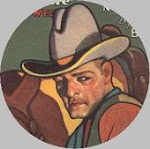In writing there is talent, which can seem like some magical thing, and there is skill, which is honed, and there is a point at which all that becomes power. Olmstead's writing in Far Bright Star shows power. The language is a beautiful, brutal poetry that is hard in its beauty. It is what Hemingway wanted and might have had if he had not let his ego and celebrity boss around his talent and skill.
Far Bright Star caught my eye because I saw a tiny horse and rider on its cover, the two figures nearly lost in a wide, dark landscape dwarfed by a broad field of sky and stars, the whole serving as a backdrop for the typography proclaiming the title and author's name. Honestly, I don't think I'd heard of Olmstead before picking up this book, but now I'm looking for more by him.
The tale takes place in the late West -- during the United States' war against Pancho Villa. This period intrigues me, thanks in part to the Fargo series by John Benteen. Napoleon Childs and his brother, Xenophon, are in charge of a band of US Cavalry located below the border, searching for Villa. Napoleon is aged (think of Sam Elliott's character, Sgt. Major Basil Plumley, in Were Were Soldiers) compared to his band of young soldiers, who have enlisted to go south for adventure. He has been honed by terrible, bone cracking experiences, and his flintiness is all that may save the cocky, proud young fools under his command.
During a patrol in the heat, white light, and sand, the band is surrounded by what Napoleon thinks is a stray gang of Villistas. Napoleon's world has made him wily, stoic, and both determined and pessimistic. His dry, business-like manner in dealing with their enemies marks him as heroic in Olmstead's narrative, no matter that he is probably someone who no one would want to have join him for a friendly drink or conversation.
"You are not being shot at personally," he told the man. He could not remember when he stopped hating those who were trying to kill him. After all, he was trying to kill them too. He'd abandoned hatred somewhere on the plains of Montana or the jungles of the Philippines. He wasn't sure, but no matter, it wasn't good to hate. It always seemed to get in the way of doing the job, always seemed to take more than it ever gave back, always seemed to get the hater killed sooner than he otherwise might have been killed.
The prose is poetically masculine and stark and vigorous in a way that recalls Anglo-Saxon heroic poetry and Icelandic sagas. There are scenes here of battle and torture and as horrific as anything in Tom Eidson's The Last Ride
Olmstead's novel ultimately is about war, that it is always present, and the men who participate -- what makes some of them warriors and others not -- and what war does to them. It's not a novel for everyone, but it will resound strongly for those who read it.






1 comment:
All four of these comments come across in a Japanese or Chinese font, and I can't read them. Any help?
Post a Comment